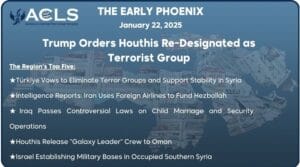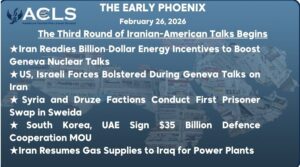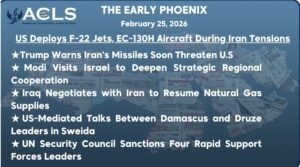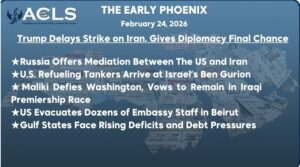★ TURKIYE
-
Türkiye Vows to Eliminate Terror Groups and Support Stability in Syria
Türkiye’s National Security Council pledged to prevent PKK/YPG exploitation in Syria and eliminate all terrorist groups threatening the region. It reaffirmed support for Syria’s sovereignty, unity, and rebuilding peace for all communities while condemning Israel’s destabilizing actions. The council called for a permanent Gaza ceasefire and uninterrupted humanitarian aid for Palestinians. Türkiye committed to advancing global peace through conflict resolution, focusing on Africa, the Middle East, and the Balkans to prevent violence and ensure stability.
-
Turkish Lawmakers Push Peace Initiative With Jailed PKK Leader Öcalan
Turkish lawmakers Sırrı Süreyya Önder and Pervin Buldan met PKK leader Abdullah Öcalan, urging him to call for disarmament under the terror-free Türkiye initiative. Backed by President Erdoğan and MHP leader Bahçeli, the plan aims to address the Kurdish issue and promote democratization. Despite concerns over transparency and leniency, the DEM Party reported positive political meetings. Öcalan emphasized Turkish-Kurdish unity as critical, marking this as a potential turning point in resolving longstanding tensions.
-
Sweden and Türkiye Strengthen Counterterrorism Cooperation and Regional Ties
Swedish Foreign Minister Maria Malmer Stenergard and Turkish Foreign Minister Hakan Fidan reinforced counterterrorism cooperation, with Sweden pledging no support for YPG, PYD, or FETÖ. Both nations, now NATO allies, agreed to enhance collaboration through liaison officers and coordinated efforts against organized crime. Discussions included Ukraine, the Israel-Hamas truce, and Syria, where Türkiye urged EU support and lifting sanctions. Sweden presented a terrorism roadmap, and Türkiye committed to supporting Sweden’s counterterrorism initiatives.
-
Fidan Strengthens Diplomatic Ties With the US and Romania on Strategic Issues
Turkish Foreign Minister Hakan Fidan discussed enhancing bilateral and regional cooperation with U.S. Secretary of State Marco Rubio and Romanian counterpart Emil Hurizianu. Fidan congratulated both on their new roles, emphasizing mutual respect and collaboration. With Rubio, talks focused on Türkiye-US partnerships in trade, energy, defense, and investments, alongside efforts to resolve disputes and boost economic ties. In discussions with Hurizianu, Fidan highlighted shared interests in political and economic fields, reinforcing commitments to regional stability and strategic partnerships.
============
★ IRAN
-
Intelligence Reports: Iran Uses Foreign Airlines to Fund Hezbollah
Western intelligence sources revealed that Iranian diplomats used foreign airlines to transfer funds to Lebanon’s Hezbollah. This strategy aims to bypass Israeli monitoring of Iranian airlines. Hezbollah, supported by Iran, faces a severe financial crisis following Israeli airstrikes targeting its military facilities and killing key leaders, including former Secretary-General Hassan Nasrallah. Sources indicated that Iran adopted a “new route” for funding, with diplomats traveling on commercial flights to regional countries before heading to Beirut carrying cash-filled suitcases.
-
Financial Times: Two Missile Fuel Ships Sail From China to Iran
Two Iranian cargo ships carrying missile propellants will sail from China to Iran in the coming weeks, according to intelligence from Western security officials. The Financial Times reported that the ships, named “Golbon” and “East Java,” flying the Iranian flag, are estimated to carry over 1,000 tons of sodium chlorate. This chemical is used to produce ammonium chlorate, a key component of solid missile propellant, the fuel required for missile launches. This propellant, also known as a propulsion agent or cushion powder, is critical for missile operations.
-
Zarif: Iran Shocked by Hamas Attack and Unaware of Plans
Iranian Vice President for Strategic Affairs Mohammad Javad Zarif stated on Wednesday that Iran was unaware of Hamas ‘ October 7 operation in Israel and was equally shocked by the attack. Speaking at the World Economic Forum in Davos, Switzerland, Zarif emphasized that “resistance will continue as long as occupation persists,” while clarifying that members of the resistance axis do not take orders from Iran.
-
Iran: Fire in Liquefied Gas Facility, Not Oil Tanks
The National Iranian Oil Products Distribution Company reported an incident involving liquefied gas storage at a facility in Rey, south of Tehran. Semi-official Tasnim News Agency, which broke the news, did not provide further details. However, Mehr News Agency clarified that the fire affected liquefied gas facilities, not oil tanks as initially reported. The CEO of the Petroleum Products Distribution Company confirmed the incident, emphasizing the facility’s storage capacity of 18,000 tons. A government oil company official also noted that the fire occurred in a liquefied gas site, refuting earlier reports about oil tanks.
-
Iran: Our Principles in Syria Will Not Change
Despite sending positive signals to Washington after Donald Trump’s return to the White House, an Iranian official issued a warning to the U.S. Mohsen Rezaee, Chairman of the Economic Coordination Council, member of the Expediency Discernment Council, and former IRGC commander, stated that Iran’s principles in Syria remain unchanged. He emphasized this position despite the fall of the Assad regime, Iran’s former ally, and the rise of transitional leaders who repeatedly asserted that Iran would have no role in their country.
-
Iran Arrests 10 Baha’i Women in “Shocking” Raids
Iranian authorities arrested 10 Baha’i women on Wednesday, escalating repression against one of the country’s largest non-Muslim religious minorities. The Baha’i International Community, representing members worldwide at the UN, stated that security forces conducted “shocking home raids” without warrants or prior notice. The statement detailed how security personnel scaled walls, coerced neighbors, and even impersonated utility workers to forcibly enter homes. The women were subjected to intrusive and distressing searches during the raids.
============
★ ISRAEL-HAMAS WAR
-
Governance and Control of Gaza and Rafah Crossing Remain Contentious
Netanyahu clarified that the Palestinian Authority’s role at Rafah Crossing is limited to stamping passports, with Israel maintaining control and passage requiring IDF and Shin Bet approval. The crossing reopened under a Qatar-, Egypt-, and U.S.-brokered agreement, allowing 600 inspected aid trucks daily. Meanwhile, Hamas supported forming a technocratic committee for Gaza’s temporary governance, focusing on reconstruction and elections. Qatar urged the Palestinian Authority’s return, but Gaza’s governance remains unresolved, with Israel opposing direct roles for Hamas or the Authority.
-
Over 2,400 Aid Trucks Enter Gaza During Ceasefire With Minimal Looting
During a three-day ceasefire, over 2,400 aid trucks entered Gaza, including 897 on Tuesday. Minor looting incidents were reported, mostly children taking food and water. The ceasefire mandates 600 daily truckloads, with half directed to famine-stricken northern Gaza. Logistical challenges, including destroyed roads, hinder aid distribution. Priorities include food, healthcare, water repairs, and shelter restoration. The UN aims to stabilize operations, ensuring sufficient aid delivery for Gaza’s population and addressing critical humanitarian needs.
-
Hamas Commander Declared Dead by Israel Reemerges in Gaza
Hussein Fayyad, Hamas’ Beit Hanoun Battalion commander, presumed killed in a May Israeli tunnel strike, appeared at a Gaza funeral. Video evidence confirmed his survival, surprising both Hamas and analysts. The IDF admitted intelligence errors, acknowledging inaccuracies in its earlier assessment. Fayyad, accused of directing anti-tank and mortar attacks during the war, has survived multiple assassination attempts, earning the nickname “leader with seven lives” and raising questions about Israel’s intelligence reliability.
-
Al-Qassam Brigades Engage in Clashes With Israeli Forces in Jenin and Document Rafah Attack
The Al-Qassam Brigades reported fierce clashes with the Israeli army near Jenin, including detonating an explosive targeting an Israeli bulldozer. The Israeli operation, aimed at disrupting armed activities, has killed ten Palestinians and damaged infrastructure. Separately, Al-Qassam documented a January 13 attack in Rafah’s Shaboura camp, where fighters targeted an Israeli building with anti-fortification shells, detonated a minefield and engaged in clashes. Both incidents occurred during a period of heightened tensions, with the Jenin operation following the Gaza ceasefire agreement.
-
Israel Intensifies Military Operations in Jenin and Samaria During Rising Security Concerns
The Israeli army expanded operations in Jenin, deploying reinforcements, air support, and snipers to remove explosives, killing 10 Palestinians and injuring dozens. Overcrowded camp residents face worsening humanitarian conditions, with infrastructure damage and displacement fears escalating. Meanwhile, the IDF neutralized a bomb-rigged drone near Yitzhar, reportedly launched from Madama, highlighting potential terrorist activities. Both incidents coincide with “Operation Iron Wall,” targeting Iranian-backed terror networks. Defense Minister Israel Katz emphasized dismantling terror camps and ensuring security, warning against further threats.
===============
★ IRAQ
-
Iraq Offers Diplomatic Role in Ukraine-Russia Conflict Resolution
Iraqi President Abdul Latif Jamal Rashid announced Iraq’s readiness to mediate between Ukraine and Russia, emphasizing efforts to bridge their perspectives. During a meeting at the World Economic Forum in Davos, Rashid discussed this initiative with Ukrainian President Volodymyr Zelensky. Zelensky commended Iraq’s neutral stance on the ongoing conflict, highlighting its potential as a constructive diplomatic partner.
-
Iraq, U.S. Discuss Reintegration of Returnees from Al-Hol Camp
Iraqi Minister of Migration Evan Faeq Jabro and U.S. Chargé d’Affaires Daniel Rubinstein discussed strategies to support displaced persons and returnees in Iraq, focusing on reintegration efforts for individuals from Syria’s Al-Hol camp. The Iraqi government, in coordination with the international coalition and regional allies, has implemented a plan to rehabilitate returnees linked to ISIS. This initiative, part of the “Return to Homeland” program, prioritizes reintegrating women and children from detention camps, including families from Al-Hol.
-
Iraq Passes Controversial Laws on Child Marriage and Security Operations
Iraq’s parliament passed amendments giving Islamic courts authority over family matters, potentially legalizing child marriage and undermining women’s rights. Critics warn of disastrous effects, while proponents argue the changes align with Islamic principles. An amnesty law for Sunni detainees and a Kurdish land restitution law also passed, sparking procedural protests. Separately, an explosion in al-Tarmiyah killed three officers during a security operation targeting Islamic State militants and ammunition caches, highlighting Iraq’s ongoing legal and security challenges.
============
★ YEMEN
-
Houthis Release “Galaxy Leader” Crew to Oman
Yemen’s Houthi movement released the crew of the ship “Galaxy Leader” after over a year of detention near Yemen’s coast. According to Houthi-affiliated Al-Masirah TV, the crew was handed over to Oman following the ceasefire agreement between Israel and Hamas in Gaza. The release was coordinated with Hamas and facilitated by Omani mediation.
-
Trump Orders Houthis Re-Designated as Terrorist Group
President Trump signed an executive order to re-designate the Iranian-backed Houthis as a terrorist group. This move follows their attacks on U.S. Navy ships, Israeli targets, and commercial vessels, threatening regional stability. The order mandates U.S. agencies to cut ties with entities linked to the Houthis and collaborate with allies to eliminate their capabilities. Supporters, including Senator Thom Tillis and the Republican Jewish Coalition, praised the decision as essential for Middle East peace and security.
=============
★ SYRIA
-
Dozens Killed in Clashes Between SDF and Turkish-Backed Factions
Intense clashes between the Syrian Democratic Forces (SDF) and Turkish-backed factions near Manbij, northern Syria, left seven fighters dead. The Syrian Observatory for Human Rights reported four casualties among Turkish-backed groups and three from the SDF during fighting around Syria Tel Hill. Additionally, Turkish drones struck a civilian gathering near Tishrin Dam south of Manbij, killing one civilian and injuring seven others, according to medical sources.
-
Israel Establishing Military Bases in Occupied Southern Syria
Israel is reportedly constructing military bases in southern Syria following its recent occupation of territories seized in December. Israeli forces gained control of areas including the UN buffer zone in the Golan Heights, Mount Hermon near the Lebanese border, and parts of Quneitra and Deraa provinces after the Assad regime was ousted. These developments mark an expansion of Israel’s presence in the region.
-
Syrian FM Unveils Economic Reforms and Addresses Governance Issues
FM Asaad Al-Shibani announced plans to privatize key sectors, attract foreign investment, and reduce reliance on humanitarian aid, urging sanctions relief to address $30 billion in debt and crumbling infrastructure. Speaking before Davos, he emphasized partnerships with Turkey, regional alliances, and rebuilding Syria with inclusive governance. Al-Shibani praised Kurds for enriching Syria’s diversity, pledging equality and justice during tensions with the SDF, which demands decentralized governance—a stance opposed by Defense Minister Marhaf Abu Qasra. The administration aims to unify authority across Syria post-Assad.
-
Syrian Defense Minister Urges Disbanding Armed Groups and Restructuring
Syrian Defense Minister Marhaf Abu Qasra called on the PKK/YPG to disband before the national conference, affirming ongoing negotiations with armed factions and the ministry’s readiness for all scenarios. The ministry’s plans include unifying factions under the Defense Ministry, restructuring the army, and appointing defected officers within two months. He discussed Turkish troop positioning, international pressure to end Israeli occupation, demining efforts, restoring ties with Russia, and urged Iran to withdraw its forces, emphasizing the army’s dedication to protecting the people and the nation.
============
★ LEBANON
-
IDF Seizes Weapons and Seeks Extension During Ceasefire Violations in Southern Lebanon
The IDF seized Hezbollah weapons, including rocket launchers and missiles, ahead of the January 27 withdrawal deadline under the ceasefire agreement. With over 120 Hezbollah violations and Lebanon accusing Israel of 800 breaches, the Lebanese army’s slow deployment raised concerns about ceasefire enforcement. The IDF requested US and Western support for a 30-day extension to destroy remaining Hezbollah weapons. Hezbollah threatened renewed war if the IDF stays, while Israel may conduct airstrikes if violations persist post-withdrawal.
===============
★ GULF NATIONS
-
Saudi Arabia Plans $600 Billion U.S. Investments Over Four Years
Crown Prince Mohammed bin Salman expressed Saudi Arabia’s intent to invest $600 billion in the U.S. over the next four years. In a call with President Donald Trump, they discussed enhancing bilateral ties, counterterrorism, and Middle East stability. Bin Salman highlighted the U.S. administration’s potential for economic growth, while Trump hinted at a possible visit to Saudi Arabia, recalling his previous trip tied to $450 billion in agreements and promising further collaboration.
-
Qatar Strengthens Regional Cooperation With Ukraine, Egypt, and Iran on Key Issues
Qatar’s Prime Minister Sheikh Mohammed bin Abdulrahman Al Thani met President Zelensky to discuss the Ukraine crisis, bilateral cooperation, and efforts to reunite Ukrainian children with families. In separate meetings with Egypt’s Prime Minister and Iran’s Vice President for Strategic Affairs Mohammad Javad Zarif at Davos 2025, discussions focused on Gaza’s ceasefire, prisoner exchanges, and developments in Syria. Qatar reaffirmed its commitment to humanitarian mediation, regional stability, and peaceful solutions, enhancing its influential role in addressing global and regional challenges.
============
★ EGYPT & North Africa
-
Egypt and Serbia Discuss Gaza Developments and Stability in Syria
Egyptian Foreign Minister Badr Abdel Aty met with his Serbian counterpart Marko Đurić on Wednesday to discuss developments in Gaza and stability in Syria. According to a statement by the Egyptian Foreign Ministry, the meeting took place in Belgrade during Abdel Aty’s visit, which began Tuesday evening and concluded Wednesday. Abdel Aty emphasized that his visit aims to build on the outcomes of President Abdel Fattah El-Sisi’s visit to Belgrade in July 2022 and Serbian President Aleksandar Vučić’s visit to Cairo in July 2024, where both countries signed a free trade agreement.
-
Mauritania and Morocco Achieve Strategic Agreement During Geopolitical Tensions
Negotiations between Morocco and Mauritania on a strategic agreement to link electricity, high-speed internet, and roads have made significant progress. This development comes despite regional geopolitical tensions, including the Western Sahara dispute, Polisario’s refusal to honor the ceasefire, Sahel instability, and the Libyan crisis. A high-level source revealed to Al-Arabiya Net/Al-Hadath.net that the Mauritanian government informed Morocco of its approval to begin implementing the electricity connection project.
-
Morocco Thwarts Smuggling Attempt of Over 9 Tons of Drugs
Moroccan authorities announced on Wednesday the interception of an attempt to smuggle over 9 tons of cannabis resin near Marrakech. According to a statement from the General Directorate of National Security, police in Marrakech, acting on precise intelligence, foiled the smuggling of 9.8 tons of cannabis resin on Tuesday evening.
Six suspects, aged between 29 and 59, were arrested for their alleged involvement in an international drug trafficking network. Among the detainees were a security officer and a municipal councilor.
-
Court Lifts Seizures on Libyan Investment Authority Funds at Euroclear Bank
The Libyan Investment Authority (LIA), Libya’s sovereign wealth fund, welcomed a Brussels Court of Appeal ruling lifting all judicial seizures on its funds at Euroclear Bank. In a statement posted on the social media platform X, the LIA confirmed that no judicial seizures remain on its assets and subsidiaries in Belgium. These seizures have been in place since 2017. Neither the Belgian court nor Euroclear has responded to requests for comment regarding the ruling.
===========




